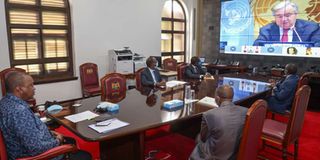Kenya regains its rightful seat among the family of nations

President Uhuru Kenyatta engages UN Secretary-General Antonio Guterres, and other leaders, during a virtual meeting on May 28, 2020 at State House, Nairobi. PHOTO | PSCU
What you need to know:
- Being a part of this elite institution is indeed an honour and a privilege for our country.
- It is also a testament to the esteem in which the international community holds our political establishment.
- Requiring a two-thirds majority of 128 votes for election, gaining a seat at the council is no easy feat.
We all held our breadth recently as the international community finalised who would be our continent’s rotating representative at the prestigious United Nations Security Council.
The Council, composed of five permanent and 10 rotating members who serve for two-year terms, is mandated with making some of the world’s most influential security decisions. These include imposing sanctions and authorising military interventions. It is also the only UN body authorised to issue resolutions that obligate other member states.
Being a part of this elite institution is indeed an honour and a privilege for our country. It is also a testament to the esteem in which the international community holds our political establishment. Requiring a two-thirds majority of 128 votes for election, gaining a seat at the council is no easy feat. The vast international network of partners established throughout the course of Uhuru’s presidency, alongside his position as a leader that is widely respected among the nation, were without a doubt the most important factors enabling our election to the council.
Considering that the seats are divided regionally, states are elected based on their capacity to adequately represent the diverse needs of their respective region of the world. Our president has time and time again shown himself to be a representative of not only Kenya, but Africa more generally. The needs of our continent were highlighted in the ten-point agenda that define the key aims of our term at the Security Council. Unsurprisingly, this is a plan that places a heavy emphasis on regional security issues, such as terrorism and border security.
Instrumental in winning the seat have been Uhuru’s efforts to address the two main refugee crises in Africa, those of Somalia and South Sudan. Uhuru has proven to be one of the staunchest supporters of the cause of Somali refugees, most recently at the Intergovernmental Authority on Development (IGAD) Special Summit on Somali refugees. There, he reiterated his government’s commitment to maintain Kenya as a safe asylum space for those fleeing war and persecution.
Uhuru has also shown restraint when addressing security challenges emanating from Somalia. Despite the strength of our armed forces and their ability to use force to quell challenges, Uhuru has instead focused on diplomatic channels. This has been due to his understanding of the potential regional implications of such a skirmish and subsequent instability for East Africa as a whole.
In the case of South Sudan, Uhuru has served as a central interlocutor, firmly encouraging both sides party to the conflict to implement the negotiated peace accord. Kenya has shown regional leadership by also heavily investing in the development of South Sudan. This has included road networks, railways and a joint project with Ethiopia to develop the Lamu Port.
The confidence which our president has expressed in the future of South Sudan as a partner of Kenya has encouraged extensive private sector investment. This has been seen in the hospitality and construction sectors, as well as through the extensive credit facilities being extended by our banks to commercial borrowers in Juba. Through these, Uhuru has exhibited his concern for regional stability as well as an understanding regarding how this plays an important role in our own country’s future.
The magnitude of our country’s return to the security council after 23 years must be understood for what it is; a vote of confidence from the international community regarding our government’s ability to steadfastly and resolutely represent our continent on a global scale. The African Union’s support for our membership similarly displayed our neighbours’ perception of our leadership’s growing international influence.
Although beating Djibouti for the seat, this should by no means be seen as a competition. In this light, the first call made by Foreign Affairs Chief Administrative Secretary Ababu Namwambwa after winning the seat was indeed to his counterparts in Djibouti City. Extending Uhuru’s message of unity to the international level, the significance of this call was to identify ways of incorporating some of the leadership of Djibouti’s ideas to our own Security Council agenda.
According to Secretary Namwambwa, “We already have a solid agenda and we will be seeking to rally African and global consensus around security issues that we have identified”. This agenda, alongside President Uhuru’s regional perspective, will be the guiding light of our representative at the Security Council when we take up our place in January 2021. It is high time that Kenya regained its rightful seat at the table among other leaders of the family of nations.




